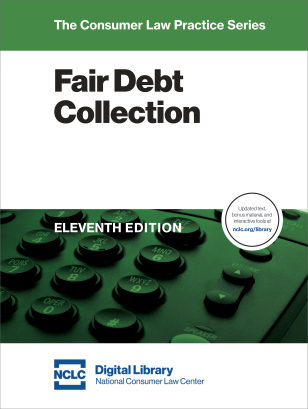The Internal Revenue Service (IRS) has begun placing federal tax debts with private debt collectors. One critical question is whether the Fair Debt Collection Practices Act (FDCPA) and its private remedies apply to these private debt collectors.
Background
Internal Revenue Code (IRC) § 6306 requires the IRS to outsource the collection of certain federal tax debts. The IRS must enter into one or more "qualified tax collection contracts" with private agencies for the collection of "inactive tax receivables." 26 U.S.C. § 6306(c). Inactive tax receivables are any tax debts in the IRS "potentially collectible inventory" that meet at least one of these criteria:
- The tax debt has been removed from active inventory by the IRS for lack of resources or inability to locate the taxpayer;
- More than one-third of the applicable statute of limitations has lapsed and the tax debt has not been by assigned to an IRS employee for collection; or
- More than one year has passed without an interaction with the taxpayer or a third party for purposes of collecting the debt.
Certain taxpayers are statutorily exempt from the program. See NCLC's Fair Debt Collection § 8.10.1.
The only activities that the IRC authorizes private debt collectors to perform are locating and contacting taxpayers, requesting full payment or offering installment agreements lasting up to five years, and obtaining financial information about the taxpayer. 26 U.S.C. § 6306(b).
Any amount collected from a taxpayer must be fully credited toward the taxpayer's tax debt; in other words, collection fees will not be deducted from the amount paid by the taxpayer. 26 U.S.C. § 6306(e). The IRS is permitted to pay private collectors up to twenty-five percent of the amount of tax debt collected.
According to an IRS analysis, 79% of the cases that are likely to be referred to private debt collectors involve taxpayers with incomes below 250% of the federal poverty level. See Letter from Nina Olson, National Taxpayer Advocate, to Senate Committee on Finance and House Ways & Means Committee 8 (May 13, 1994).
This is not the first time the IRS has tried to use private collectors, and such prior efforts were far from successful. For a history of prior IRS efforts to use private collectors, see Fair Debt Collection § 8.10.2.
FDCPA Applicability and Other Taxpayer Protections
Any contract between the IRS and a private collector must prohibit the collector from committing any act or omission that IRS employees are prohibited from committing in the performance of similar duties. 26 U.S.C. § 6306(b)(2). These prohibitions include communicating at inconvenient times and places; contacting represented debtors (with certain exceptions); calling the debtor at work if the collector knows the debtor's employer prohibits such calls; and various other types of harassment and abuse See 26 U.S.C. § 6304. See also NCLC's Collection Actions § 10.2.13.10.
In addition, the IRS Code provides that "[t]he provisions of the Fair Debt Collection Practices Act shall apply to any qualified tax collection contract." 26 U.S.C. § 6306(g). While the law says that the FDCPA shall apply to the contract, the legislative history shows that Congress meant by this language that provisions of the FDCPA "apply to the private debt collection company." Conference Rep. No. 108-755 (2004).
Thus, the FDCPA should apply to private collectors of IRS tax debts, despite the fact that the FDCPA normally does not apply to tax debts. See Fair Debt Collection § 4.4.2.3.
There is an exception to the extent that the FDCPA is superseded by: (1) IRC § 6304, which establishes the prohibitions discussed above that are very similar to the FDCPA; (2) IRC § 7602(c) governing contact with third parties; and (3) "any other provision" of the IRC. See 26 U.S.C. § 6306(g), cross-referencing 26 U.S.C. §§ 6304, 7602(c).
Remedies for Violations by Private Collectors
The IRC includes a civil remedy against a debt collector who recklessly, intentionally, or negligently disregards any provision of the tax code or any regulation under it. 26 U.S.C. §§ 7433A, 7433(a). The taxpayer has the right to bring suit in federal court for "actual, direct economic damages," with a cap of $1,000,000 ($100,000 in the case of negligence), plus costs. 26 U.S.C. § 7433, incorporated by reference in 26 U.S.C. § 7433A(a).
Unlike suits when the misdeeds are committed by IRS employees, the plaintiff need not exhaust administrative remedies. However, the law insulates the IRS from liability for any misconduct by the private collector, permitting suit to be brought against the private tax collector only, not against the United States. 26 U.S.C. § 7433A(b)(1), (4). See also26 U.S.C. § 6306(f).
FDCPA private remedies should also apply to private collectors when collecting tax debts. The IRC makes the FDCPA applicable to the private debt collection program. 26 U.S.C. § 6306(g). There is an exception to the extent that the FDCPA is superseded by, inter alia, "any other provision" of the IRC, which would include the civil remedy discussed above. 26 U.S.C. § 6306(g), cross-referencing 26 U.S.C. §§ 6304, 7602(c).
This section provides that "such civil action shall be the exclusive remedy for recovering damages resulting from such actions." 26 U.S.C. § 7433(a). However, the IRS private collection provision specifically refers to IRC § 7433A to establish a civil remedy. See 26 U.S.C. § 6306(k)(1). Section 7433A in turn states that "[s]uch civil action shall not be an exclusive remedy with respect to such person." 26 U.S.C. § 7433A(b)(3).
Thus, a taxpayer's remedy for unlawful debt collection activities is not limited to the IRC's civil remedy provision, and FDCPA civil remedies should be applicable for private collectors conduct in collecting IRS tax debts. This is important because the IRC civil remedy provision does not provide for statutory damages or attorney fees. 26 U.S.C. § 7433(b). Private collectors should also be liable for common law torts committed in the course of collecting tax debts, whose remedies might include punitive damages.


